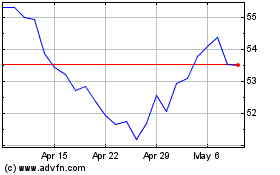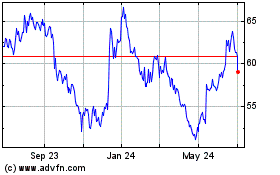Incyte Corporation (Nasdaq:INCY) today announced that the first
patient has been treated in the RESET pivotal trial evaluating
ruxolitinib (Jakafi®) compared to anagrelide for the treatment of
patients with essential thrombocythemia (ET) who are resistant to
or intolerant of hydroxyurea (HU).
“We are pleased to treat the first patient in our pivotal trial
evaluating ruxolitinib as a treatment for ET, a rare blood cancer
that can lead to life-threatening complications,” said Steven
Stein, M.D., Chief Medical Officer, Incyte. “We look forward to
building on the clinical evidence for ruxolitinib and to advancing
this trial to help address the needs of higher-risk patients with
ET, who are resistant to or intolerant of HU and currently have
limited treatment options.”
ET is a rare, chronic blood cancer, part of a group of related
blood cancers known as myeloproliferative neoplasms (MPNs),
characterized by increased platelet production, a white cell count
above the normal range, persistently elevated platelet counts with
normal red blood cell mass and the absence of prominent bone marrow
fibrosis.1 An increased platelet count can increase the risk of
thrombosis. Thrombosis can, in turn, lead to serious health
problems including heart attack or stroke. Vascular complications
and transformation to myelofibrosis (MF) or acute myeloid leukemia
(AML) are the major causes of increased morbidity and mortality in
patients with ET.2,3
About the RESET Study
The randomized, double-blind, double-dummy pivotal study
(NCT03123588) is evaluating the safety and efficacy of ruxolitinib
versus anagrelide as a treatment of patients with ET. The study is
expected to enroll approximately 120 patients, 18 years or older,
diagnosed with ET who are resistant to or intolerant of HU, with a
screening platelet count of >650 × 109/L and white blood cell
(WBC) count of >11.0 × 109/L.
The primary endpoint of this study is the proportion of patients
who achieve platelet and WBC control over 1 year of follow-up. Key
secondary endpoints include safety and tolerability and the
proportion of patients who achieve complete remission (CR) or
partial remission (PR). For more information about the study,
please visit https://clinicaltrials.gov/ct2/show/NCT03123588.
About Jakafi® (ruxolitinib)
Ruxolitinib is a first-in-class JAK1/JAK2 inhibitor approved by
the U.S. Food and Drug Administration, as Jakafi® (ruxolitinib),
for treatment of people with polycythemia vera (PV) who have had an
inadequate response to or are intolerant of hydroxyurea.
Jakafi is also indicated for treatment of people with
intermediate or high-risk myelofibrosis (MF), including primary MF,
post–polycythemia vera MF, and post–essential thrombocythemia
MF.
Jakafi is marketed by Incyte in the United States and by
Novartis as Jakavi® (ruxolitinib) outside the United States.
Important Safety Information
Jakafi can cause serious side effects, including:
Low blood counts: Jakafi® (ruxolitinib) may cause your
platelet, red blood cell, or white blood cell counts to be lowered.
If you develop bleeding, stop taking Jakafi and call your
healthcare provider. Your healthcare provider will perform blood
tests to check your blood counts before you start Jakafi and
regularly during your treatment. Your healthcare provider may
change your dose of Jakafi or stop your treatment based on the
results of your blood tests. Tell your healthcare provider right
away if you develop or have worsening symptoms such as unusual
bleeding, bruising, tiredness, shortness of breath, or a fever.
Infection: You may be at risk for developing a serious
infection during treatment with Jakafi. Tell your healthcare
provider if you develop any of the following symptoms of infection:
chills, nausea, vomiting, aches, weakness, fever, painful skin rash
or blisters.
Skin cancers: Some people who take Jakafi have developed
certain types of non-melanoma skin cancers. Tell your healthcare
provider if you develop any new or changing skin lesions.
Increases in Cholesterol: You may have changes in your
blood cholesterol levels. Your healthcare provider will do blood
tests to check your cholesterol levels during your treatment with
Jakafi.
The most common side effects of Jakafi include: low
platelet count, low red blood cell counts, bruising, dizziness,
headache.
These are not all the possible side effects of Jakafi. Ask your
pharmacist or healthcare provider for more information. Tell your
healthcare provider about any side effect that bothers you or that
does not go away.
Before taking Jakafi, tell your healthcare provider
about: all the medications, vitamins, and herbal supplements
you are taking and all your medical conditions, including if you
have an infection, have or had tuberculosis (TB), or have been in
close contact with someone who has TB, have or had hepatitis B,
have or had liver or kidney problems, are on dialysis, had skin
cancer or have any other medical condition. Take Jakafi exactly as
your healthcare provider tells you. Do not change or stop taking
Jakafi without first talking to your healthcare provider. Do not
drink grapefruit juice while on Jakafi.
Women should not take Jakafi while pregnant or planning to
become pregnant, or if breast-feeding.
Full Prescribing Information, which includes a more complete
discussion of the risks associated with Jakafi, is available at
www.jakafi.com.
About Incyte
Incyte Corporation is a Wilmington, Delaware-based
biopharmaceutical company focused on the discovery, development and
commercialization of proprietary therapeutics. For additional
information on Incyte, please visit the Company’s website at
www.incyte.com.
Follow @Incyte on Twitter
at https://twitter.com/Incyte.
Forward Looking Statements
Except for the historical information set forth herein, the
matters set forth in this press release, including statements
regarding the Company’s expectations for the study evaluating
ruxolitinib as a treatment for ET, contain predictions, estimates
and other forward-looking statements. These forward-looking
statements are based on the Company’s current expectations and
subject to risks and uncertainties that may cause actual results to
differ materially, including unanticipated developments and the
risks related to the efficacy or safety of the Company’s
development pipeline, the results of further research and
development, the high degree of risk and uncertainty associated
with drug development, clinical trials and regulatory approval
processes, other market or economic factors and competitive and
technological advances; and other risks detailed from time to time
in the Company’s reports filed with the Securities and Exchange
Commission, including its Form 10-Q for the quarter ended September
30, 2017. Incyte disclaims any intent or obligation to update these
forward-looking statements.
______________________________
i Tefferi A, Thiele J, Orazi A, et al. Proposals and
rationale for revision of the World Health Organization diagnostic
criteria for polycythemia vera, essential thrombocythemia, and
primary myelofibrosis: recommendations from an ad hoc international
expert panel. Blood 2007;110:1092-109 7. ii Passamonti F, Rumi E,
Arcaini L, et al. Prognostic factors for thrombosis, myelofibrosis,
and leukemia in essential thrombocythemia: a study of 605 patients.
Haematologica 2008;93:1645-1651. iii Besses C, Cervantes F, Pereira
A, et al. Major vascular complications in essential
thrombocythemia: a study of the predictive factors in a series of
148 patients. Leukemia 1999;13:150-154.
View source
version on businesswire.com: http://www.businesswire.com/news/home/20171115005448/en/
MediaCatalina Loveman,
+1-302-498-6171cloveman@incyte.comorInvestorsMichael Booth,
DPhil, +1-302-498-5914mbooth@incyte.com
Incyte (NASDAQ:INCY)
Historical Stock Chart
From Mar 2024 to Apr 2024

Incyte (NASDAQ:INCY)
Historical Stock Chart
From Apr 2023 to Apr 2024
